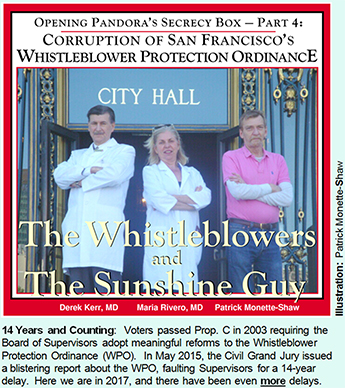 Article in Print Printer-friendly PDF file
Article in Print Printer-friendly PDF fileWestside Observer Newspaper
April 2017 at www.WestsideObserver.com
City Employees Deserve Strengthened Anti-Retaliation Law
Slouching Toward Whistleblower Protections
 Article in Print Printer-friendly PDF file
Article in Print Printer-friendly PDF file
Westside Observer
Newspaper
April 2017 at www.WestsideObserver.com
City Employees Deserve Strengthened Anti-Retaliation Law
Slouching Toward Whistleblower Protections
by Patrick Monette-Shaw
[See April 3 Postscript at End of Article]
A fair question to now ask is “Have 33 members of the Board of Supervisors failed to screw in a light bulb during the past 14 years”? Really? How many does it take?
Taxpayers throughout San Francisco have a keen interest in the answer, because it goes to a larger question: Just how much fraud, waste, and abuse of City resources has gone undetected due to the Board of Supervisors failure to adopt a meaningful Whistleblower Protection Ordinance (WPO) since 2003?
 We’ve had 33 citywide, or district, Board of Supervisors since 2003. None of them managed to get the WPO amended during all that time? Is slouching toward reform the new normal?
We’ve had 33 citywide, or district, Board of Supervisors since 2003. None of them managed to get the WPO amended during all that time? Is slouching toward reform the new normal?
After all, without meaningful anti-retaliation protections, whistleblowers may be reluctant to expose wrongdoing and fraud without adequate protections in place. You have to wonder just how much waste, fraud, and abuse has gone unreported by City employee whistleblowers who fear on-the-job retaliation.
 Conversely, with adequate anti-retaliation protections, employees might be more inclined to report wrongdoing in City government.
Conversely, with adequate anti-retaliation protections, employees might be more inclined to report wrongdoing in City government.
The Board of Supervisors should amend the WPO, if for no other reason, than to help City Administrator Naomi Kelly, who was recommended by the Board’s Rules Committee on February 8, 2017 for a five-year re-appointment. Rules Committee member Supervisor Norman Yee asked Kelly during that hearing about her plans to reduce the amount of lawsuits against the City. Since the Office of Contract Administration is one of the departments that reports to her, you’d think she might take an interest in whistleblower complaints involving City contractors to help reduce lawsuits.
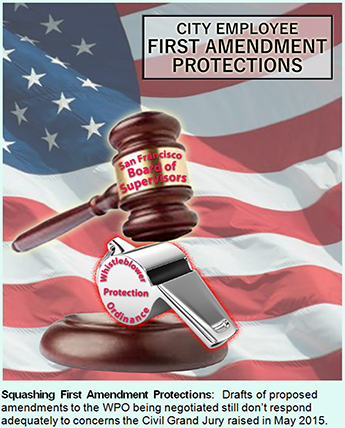 Civil Grand Jury Raises Over-Arching Concerns
Civil Grand Jury Raises Over-Arching Concerns
In July 2015, the Westside Observer published “Retaliators Keep Their City Jobs, which reported on the San Francisco 2014–2015 Civil Grand Jury’s report, “Whistleblower Protection Ordinance Is in Need of Change,” released June 8, 2015 but dated May 2015.
The Jury noted voters enacted Proposition C in 2003 adding a mandate to the City Charter requiring the Board of Supervisors to “enact and maintain an ordinance … protecting City officers and employees from retaliation” for filing complaints about improper government activity.
The Grand Jury wrote:
“We conclude that the Board has failed to carry out this mandate because it has failed to enact and maintain an ordinance that genuinely protects those who make such reports.”
The Jury noted that in the 15-year history of the Ethics Commission, no complaint of whistleblower retaliation ever resulted in a public accusation of wrongdoing, all complaints had been investigated in secret, and all complaints were dismissed without any public proceedings.
[Note: The Grand Jury was incorrect; the Ethics Commission was created by passage of Proposition K in November 1993, so at the time the Jury wrote its report in 2015 the Ethics Commission had been around for 22 years. The Grand Jury may have been referring to the 15-year period following passage of Ordinance 71-00 in April 2000 calling on the Ethics Commission to provide an annual report to the Board of Supervisors listing the number of whistleblower complaints filed with Ethics and other data related to those complaints.]
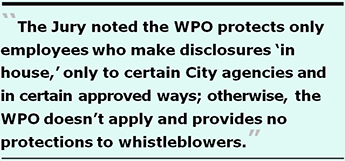 For his part, former Laguna Honda Hospital senior physician Dr. Derek Kerr — who was terminated in 2010 for whistleblowing involving LHH’s patient gift fund misappropriated for staff perks, and successfully won his wrongful termination lawsuit — noted during an Ethics Commission hearing on June 29, 2015 that in the 20 years since 1995 the Commission hadn’t substantiated any retaliation claims.
For his part, former Laguna Honda Hospital senior physician Dr. Derek Kerr — who was terminated in 2010 for whistleblowing involving LHH’s patient gift fund misappropriated for staff perks, and successfully won his wrongful termination lawsuit — noted during an Ethics Commission hearing on June 29, 2015 that in the 20 years since 1995 the Commission hadn’t substantiated any retaliation claims.
The Grand Jury reported that although “San Francisco has enacted a series of ordinances intended to protect City officers and employees from retaliation for reporting improper government activity” since 1989, and over the years, “the scope of these so-called ‘whistleblower protection’ laws has narrowed.”
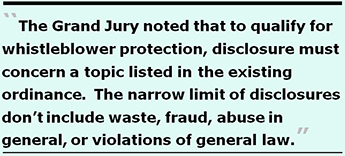 The Jury noted that between January 1, 2011 and November 18, 2014, the Ethics Commission received 34 whistleblower retaliation complaints, all of which were dismissed by its then-Executive Director, John St. Croix, who has thankfully finally been replaced with someone more competent.
The Jury noted that between January 1, 2011 and November 18, 2014, the Ethics Commission received 34 whistleblower retaliation complaints, all of which were dismissed by its then-Executive Director, John St. Croix, who has thankfully finally been replaced with someone more competent.
The Jury noted that the WPO protects only employees who make disclosures “in house.” In order to have the WPO apply, whistleblowers must disclose their government wrongdoing complaints only to certain City government agencies and in certain approved ways; otherwise, the WPO doesn’t apply and provides no protections. The Jury wrote:
“[The WPO] does not protect disclosures that are made by other means, or to persons or entities that are not listed in the ordinance: for example, to news media, to outside law enforcement agencies, or to elected officials outside City government. Thus, a City employee who discloses government wrongdoing or corruption to the San Francisco Chronicle, or to the California Attorney General, or to the F.B.I., or to Congress, is not a ‘whistleblower’ entitled to protection under the WPO.”
The Grand Jury also noted that to qualify for whistleblower protection, disclosure must concern a topic listed in the existing ordinance. Among the WPO’s narrow limit of disclosures, waste, fraud, abuse in general, or violations of general law are not included. The Jury noted whistleblowers who disclose such information aren’t protected from retaliation. The Jury raised other concerns, including that only a few types of retaliation are specified, and complainants face an extraordinary burden of proof that doesn’t apply to any other types of complaints.
The Jury raised many other substantial concerns, recommending:
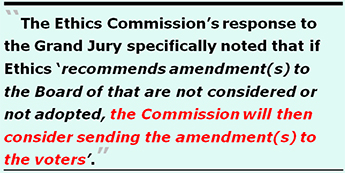 Ethics Commission Sticks Its Toes in the Water
Ethics Commission Sticks Its Toes in the Water
Because the Grand Jury required the Ethics Commission to formally respond to its report, the Commission finally stuck its toes in the water.
Ethics Commission's Response to the Grand Jury
During the Ethics Commission’s June 29, 2015 meeting it discussed the Commission’s proposed response to the Jury.
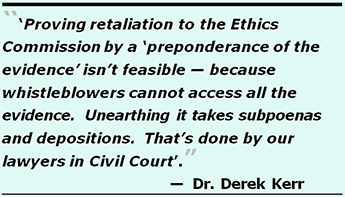 In response to the Grand Jury’s recommendation that amendments to the WPO provide a meaningful remedy for the effects of retaliation to include authorizing the Ethics Commission to order cancellation of retaliation job actions and increase the limit of civil penalties, once again the Ethics Commission responded to the Jury that the recommendations “may be implemented.”
In response to the Grand Jury’s recommendation that amendments to the WPO provide a meaningful remedy for the effects of retaliation to include authorizing the Ethics Commission to order cancellation of retaliation job actions and increase the limit of civil penalties, once again the Ethics Commission responded to the Jury that the recommendations “may be implemented.”Dr. Derek Kerr, the whistleblower wrongfully terminated from Laguna Honda Hospital, notes:
“Proving retaliation to the Ethics Commission by a ‘preponderance of the evidence’ isn’t feasible — because whistleblowers cannot access all the evidence. Unearthing it takes subpoenas and depositions. That’s done by our lawyers in Civil Court — not by Ethics investigators on the City’s payroll.”
The meeting minutes show the Commission voted 5–0 on a motion to approve the draft responses to the Grand Jury. Of interest, like minutes of most of the Ethics Commission’s meetings, the June 29 meeting minutes do not contain any summaries of the debate or discussion between Ethics Commissioners on its planned response to the Grand Jury. The only way to learn what the Commissioners discussed is to listen to the audio or video posted on the SFGOV-TV web site.
Paucity of Ethics Commission Hearings on Proposed WPO Amendments
The Commission held just two hearings on the proposed amendments to the WPO.
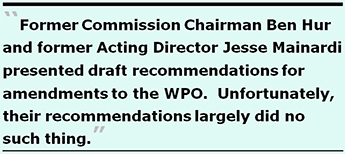 January 25, 2016 Ethics Commission Meeting
January 25, 2016 Ethics Commission Meeting
After responding to the Grand Jury in June, the Ethics Commission decided on January 25, 2016 that it would indeed sponsor amendments to the Whistleblower Protection Ordinance. That added another six-month delay in slouching toward WPO reforms.
Former Commission Chairman Ben Hur (yes, that’s his real name) and former Acting Director Jesse Mainardi presented draft recommendations for amendments to the WPO to the Ethics Commission. Unfortunately, their recommendations largely did no such thing.
After noting in their Introduction and Summary that the Grand Jury’s report broadly concerned three issues — the scope of the ordinance, the Ordinance’s enforcement process, and remedies available in the Ordinance to complainants — the pair of men mostly proposed the Ethics Commission develop regulations, not substantial and actual amendments to the WPO itself.
 The two proposed expanding the definition of whistleblowing to cover oral complaints, and the scope of disclosure to “providing information,” both by expanding the Ethics Commission’s regulations. They did recommend Ethics staff draft amendments to the Ordinance to cover disclosures made to a City agency other than the complainant’s own.
The two proposed expanding the definition of whistleblowing to cover oral complaints, and the scope of disclosure to “providing information,” both by expanding the Ethics Commission’s regulations. They did recommend Ethics staff draft amendments to the Ordinance to cover disclosures made to a City agency other than the complainant’s own.
They recommended against expanding the Ordinance to cover City contractors for the flimsiest of reasons. The pair recommended Ethics staff be directed to draft regulations specifying the definition of other types of adverse employment beyond just termination, demotion, and suspension.
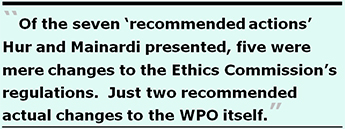 The two men recommended that Ethics staff draft proposed amendments to the Ordinance authorizing the Commission to cancel retaliatory job actions based on the “totality” of the circumstances, and to increase the maximum civil penalty against those who retaliate against another City employee to $10,000.
The two men recommended that Ethics staff draft proposed amendments to the Ordinance authorizing the Commission to cancel retaliatory job actions based on the “totality” of the circumstances, and to increase the maximum civil penalty against those who retaliate against another City employee to $10,000.
Finally, they recommended Ethics staff should draft regulations specifying that the “preponderance of evidence” standard should not apply during the investigatory phase, and only during actual adjudication of whistleblower complaints.
Overall, of the seven “recommended actions” that Hur and Mainardi presented on January 25, 2016 five recommended mere changes to the Ethics Commission’s regulations, and just two recommended actual changes to the WPO itself.
February 29, 2016 Ethics Commission Meeting
Although the agenda for its February 29 meeting had listed a topic to further discuss proposed amendments to the WPO, the Commission voted 5–0 on a motion to continue the item to its next meeting.
March 28, 2016 Ethics Commission Meeting
By March 2016, Ben Hur and Mr. Mainardi were (thankfully) gone.
When the proposed WPO amendments were again heard on March 28, the Commission’s new Executive Director, LeeAnn Pelham (who to her credit is a substantial improvement over John St. Croix) provided background material to Ethics Commissioners, along with two options for potential amendments to the WPO.
 Pelham’s Option 1 involved minor changes only to Ethics Commission regulations that would have become effective 60 days after adoption by the Commission. Option 1 was adopted and changes to Ethics’ regulations did become effective.
Pelham’s Option 1 involved minor changes only to Ethics Commission regulations that would have become effective 60 days after adoption by the Commission. Option 1 was adopted and changes to Ethics’ regulations did become effective.
The second option — involving extensive amendments to the WPO — would require the Board of Supervisors to actually amend the ordinance, even though changes to the Commission’s regulations had already become effective.
Pelham’s Option 1 included amending Ethics regulations to:
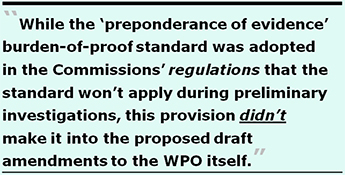 Expand the definition of “other adverse employment” actions beyond just termination, demotion, or suspension. The expanded definition did not make it into the eventual draft WPO amendments submitted by Ethics to the Board of Supervisors in April 2016.
Expand the definition of “other adverse employment” actions beyond just termination, demotion, or suspension. The expanded definition did not make it into the eventual draft WPO amendments submitted by Ethics to the Board of Supervisors in April 2016. Of interest, Pelham’s Option 1 declined to amend Ethics regulations to provide protections for employees of City contractors and didn’t mention contractor employees at all.
Of interest, Pelham’s Option 1 declined to amend Ethics regulations to provide protections for employees of City contractors and didn’t mention contractor employees at all.
Again, the March 28 meeting minutes do not contain any summary of debate or discussion by Ethics Commissioner’s. The meeting minutes do report Ethics Commissioner’s voted 5–0 on a motion to adopt more extensive actual amendments to the WPO itself.
Pelham’s Option 2 involved recommendations to actually amend the Whistleblower Protection Ordinance to:
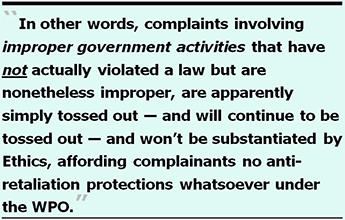 Expand the WPO to cover anti-retaliation protections for employees of City contractors, in addition to City employees. Pelham specifically noted that amendments to the WPO should provide that complaints could include reporting information about “improper governmental activities” by employees of City contractors. Eventually, although that provision was included into WPO amendments submitted to the Board of Supervisors in April 2016, the provision was changed to only providing information about “unlawful activities” by employees of City contractors. Reporting of “improper government activities” by employees of contractors was removed in the January 2017 amendments.
Expand the WPO to cover anti-retaliation protections for employees of City contractors, in addition to City employees. Pelham specifically noted that amendments to the WPO should provide that complaints could include reporting information about “improper governmental activities” by employees of City contractors. Eventually, although that provision was included into WPO amendments submitted to the Board of Supervisors in April 2016, the provision was changed to only providing information about “unlawful activities” by employees of City contractors. Reporting of “improper government activities” by employees of contractors was removed in the January 2017 amendments.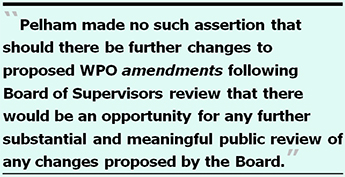 In other words, complaints involving improper government activities that have not actually violated a law but are nonetheless improper, are apparently simply tossed out — and will continue to be tossed out — and won’t be substantiated by Ethics, affording complainants no anti-retaliation protections whatsoever under the WPO. It seems that the “preponderance of evidence” burden-of-proof standard is alive and well — albeit disguised — by preliminary review standards nowhere clearly specified in either the Ethics Commission’s “regulations” or in the WPO. How convenient is that? Does that explain why so many whistleblower complaints investigated by Ethics over the past two decades were simply dismissed, without public hearings?
In other words, complaints involving improper government activities that have not actually violated a law but are nonetheless improper, are apparently simply tossed out — and will continue to be tossed out — and won’t be substantiated by Ethics, affording complainants no anti-retaliation protections whatsoever under the WPO. It seems that the “preponderance of evidence” burden-of-proof standard is alive and well — albeit disguised — by preliminary review standards nowhere clearly specified in either the Ethics Commission’s “regulations” or in the WPO. How convenient is that? Does that explain why so many whistleblower complaints investigated by Ethics over the past two decades were simply dismissed, without public hearings?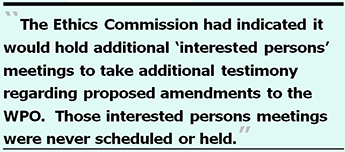 Importantly, Pelham noted in her March 23, 2016 explanatory memo to Ethics Commissioners that if any further revisions to the draft regulations were made, they would be circulated for further public review and comment, with further actions on the regulations to be scheduled at a future Ethics Commission meeting.
Importantly, Pelham noted in her March 23, 2016 explanatory memo to Ethics Commissioners that if any further revisions to the draft regulations were made, they would be circulated for further public review and comment, with further actions on the regulations to be scheduled at a future Ethics Commission meeting.
Unfortunately Pelham made no such assertion that should there be further changes to proposed WPO amendments following Board of Supervisors review that there would be an opportunity for further substantial and meaningful public review of any changes proposed by the Board — beyond the skimpy two-minute public comment period typically afforded to members of the public during Board meetings.
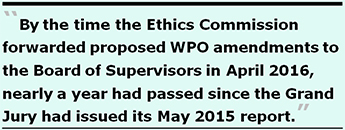 Importantly the Ethics Commission had indicated it would hold additional “interested persons” meetings to take additional testimony regarding proposed amendments to the WPO prior to Ethics completing its recommendations. Those interested persons meetings were never scheduled or held, and Ethics suddenly forwarded its March 23, 2016 WPO amendment recommendations to the Board of Supervisors without taking further public comment.
Importantly the Ethics Commission had indicated it would hold additional “interested persons” meetings to take additional testimony regarding proposed amendments to the WPO prior to Ethics completing its recommendations. Those interested persons meetings were never scheduled or held, and Ethics suddenly forwarded its March 23, 2016 WPO amendment recommendations to the Board of Supervisors without taking further public comment.
Ethics Commission Forwards Proposed WPO Amendments to Board of Supervisors
Following its March 28 hearing, the Ethics Commission subsequently forwarded proposed amendments (Option 2) to the WPO to the Board of Supervisors on April 11, 2016. By that time, nearly a year had passed since the Grand Jury had issued its May 2015 report. Subsequent significant amendments to those proposed in April 2016 are discussed below.
Gang of Four's Delay: One Step Forward, Two Steps Back
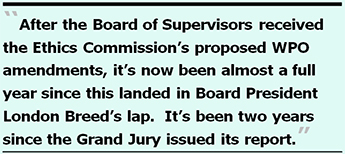 Once the Board of Supervisors got its hands on the Ethics Commission’s proposed WPO amendments on April 11, 2016 you could almost predict there would be even more delay slouching towards Bethlehem and meaningful whistleblower protections reform. It’s now been almost a full year since this landed in Board President London Breed’s lap. She hasn’t exhibited any sense of urgency, and the process continues to slouch forward. It’s now been two years since the Grand Jury issued its report calling for WPO amendments.
Once the Board of Supervisors got its hands on the Ethics Commission’s proposed WPO amendments on April 11, 2016 you could almost predict there would be even more delay slouching towards Bethlehem and meaningful whistleblower protections reform. It’s now been almost a full year since this landed in Board President London Breed’s lap. She hasn’t exhibited any sense of urgency, and the process continues to slouch forward. It’s now been two years since the Grand Jury issued its report calling for WPO amendments.
The “Gang of Four” includes the Board of Supervisors, City Controller, Department of Human Resources (DHR) — and surprisingly — the Ethics Commission itself. There have been no public meetings of the four-agency team to take input or public comment on the proposed revisions to the WPO winding its way through City government.
With that said, DHR did respond on March 2, 2017 to a public records request and provided the current working version as of January 17, 2017 of proposed WPO amendments being collaboratively hammered out by the four agencies, but behind closed doors.
 A comparison of the January 2017 amendments changed by the “Gang of Four” from amendments submitted to Supervisor Breed in March 2016 is instructive, and discussed below.
A comparison of the January 2017 amendments changed by the “Gang of Four” from amendments submitted to Supervisor Breed in March 2016 is instructive, and discussed below.
DHR also indicated that various labor unions representing City employees had been invited to a “meet-and-confer” session on March 13, 2017, billed as discussing WPO changes that would “create new obligations for all City supervisory employees.” Horse-hockey! There is little, if anything, that creates “new obligations.”
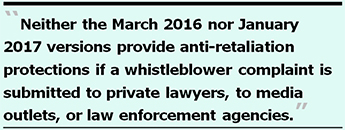 Three unions had RSVP’d to attend: The Management Executive Association (MEA), Laborers Local 261, and Electrical Workers Local 6. The MEA and Electrical Workers attended the meet-and-confer session, along with SEIU Local 1021 at the last minute. The Laborers union didn’t attend.
Three unions had RSVP’d to attend: The Management Executive Association (MEA), Laborers Local 261, and Electrical Workers Local 6. The MEA and Electrical Workers attended the meet-and-confer session, along with SEIU Local 1021 at the last minute. The Laborers union didn’t attend.
That meet-and-confer session was closed to members of the public, and we have yet to see what, if any, changes to the proposed WPO amendments the City’s unions may end up demanding be made following that meeting.
Comparison of Changes Recommended by Ethics vs. Gang of Four Changes
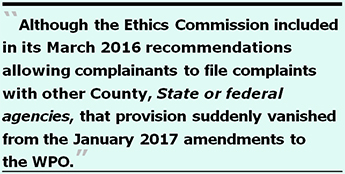 A detailed side-by-side comparison of proposed WPO amendments submitted by Ethics to the Clerk of the Board and subsequent revised amendments made by the four-agency team is instructive. Major changes to proposed WPO amendments include:
A detailed side-by-side comparison of proposed WPO amendments submitted by Ethics to the Clerk of the Board and subsequent revised amendments made by the four-agency team is instructive. Major changes to proposed WPO amendments include:
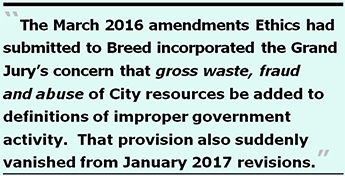 The March 2016 amendments Ethics submitted to the Clerk of the Board had, to its credit, specifically incorporated the Grand Jury’s concern that gross waste, fraud and abuse of City resources be added to definitions of improper government activity,but gross waste, fraud and abuse was suddenly eliminated in the January 2017 version written by the four-agency collaborative team. It’s not known who eliminated it, or why.
The March 2016 amendments Ethics submitted to the Clerk of the Board had, to its credit, specifically incorporated the Grand Jury’s concern that gross waste, fraud and abuse of City resources be added to definitions of improper government activity,but gross waste, fraud and abuse was suddenly eliminated in the January 2017 version written by the four-agency collaborative team. It’s not known who eliminated it, or why.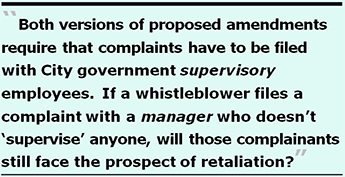 Both the March 2016 and January 2017 versions of proposed WPO amendments require that complaints have to be filed with City government supervisory employees. This is nonsense, since there are thousands of high-level City managers who don’t directly “supervise” any employees. They’re managers. If a whistleblower files a complaint with one of these managers who doesn’t supervise anyone, will those complainants still face the prospect of retaliation?
Both the March 2016 and January 2017 versions of proposed WPO amendments require that complaints have to be filed with City government supervisory employees. This is nonsense, since there are thousands of high-level City managers who don’t directly “supervise” any employees. They’re managers. If a whistleblower files a complaint with one of these managers who doesn’t supervise anyone, will those complainants still face the prospect of retaliation?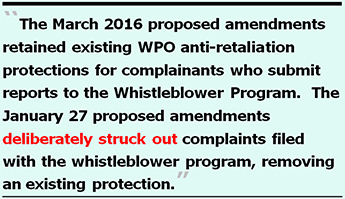 Why would a Whistleblower Protection Ordinance explicitly remove the 2008 expanded protection to file complaints with the Whistleblower Program? That’s sheer irony! Why propose further constricting the already-narrow list of complaint types covered under anti-retaliation protection provisions? [Update: See Postscript]
Why would a Whistleblower Protection Ordinance explicitly remove the 2008 expanded protection to file complaints with the Whistleblower Program? That’s sheer irony! Why propose further constricting the already-narrow list of complaint types covered under anti-retaliation protection provisions? [Update: See Postscript]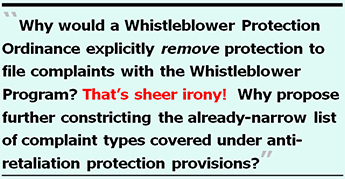 expressing their personal opinions on any matter of public concern while not on duty. Sunshine Ordinance §67.22(e) goes further, saying “public employees shall not be discouraged from or disciplined for disclosing any information that is public information or a public record to any journalist or any member of the public.” It’s long past time that extant language in Sunshine Ordinance §67.22(d) and §67.22(e) be replicated, as is, into WPO §4.115(a).
expressing their personal opinions on any matter of public concern while not on duty. Sunshine Ordinance §67.22(e) goes further, saying “public employees shall not be discouraged from or disciplined for disclosing any information that is public information or a public record to any journalist or any member of the public.” It’s long past time that extant language in Sunshine Ordinance §67.22(d) and §67.22(e) be replicated, as is, into WPO §4.115(a).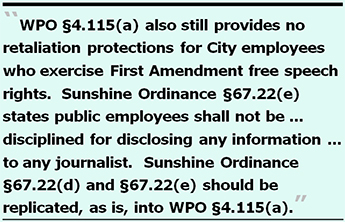 §4.115(c)(iii) PROTECTION OF WHISTLEBLOWERS — PENALTIES AND REMEDIES
§4.115(c)(iii) PROTECTION OF WHISTLEBLOWERS — PENALTIES AND REMEDIES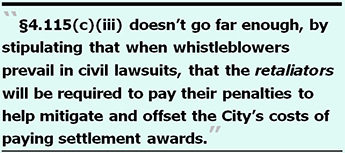 employment actions against City employees. Remarkably, the January 2017 WPO amendments proposed by the four-agency collaborators deliberately removed Ethics Commission cancellation of retaliatory job actions for City employees, but retained cancellation of retaliatory job actions for employees of City contractors. The four-agency collaborative team simply removed §4.115(c)(iv) that had been added by Ethics in March 2016, and added the new WPO §4.117(c)(2) granting permission for the Ethics Commission to order cancellation of retaliatory actions against employees of City contractors. [Update: See Postscript]
employment actions against City employees. Remarkably, the January 2017 WPO amendments proposed by the four-agency collaborators deliberately removed Ethics Commission cancellation of retaliatory job actions for City employees, but retained cancellation of retaliatory job actions for employees of City contractors. The four-agency collaborative team simply removed §4.115(c)(iv) that had been added by Ethics in March 2016, and added the new WPO §4.117(c)(2) granting permission for the Ethics Commission to order cancellation of retaliatory actions against employees of City contractors. [Update: See Postscript]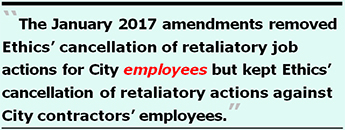 §4.115(f) WHISTLEBLOWER PROTECTION AWARENESS TRAINING
§4.115(f) WHISTLEBLOWER PROTECTION AWARENESS TRAINING  Continuing Shortcomings of Proposed WPO Amendments
Continuing Shortcomings of Proposed WPO Amendments
Larry Bush, principal co-founder of the San Francisco Friends of Ethics group comprised of former members of the Civil Grand Jury, Ethics Commission, and Sunshine Task Force, notes:
“Friends of Ethics has testified at every Ethics Commission session with the Whistleblower reform on the agenda. We remain concerned that several critical elements still are not included:
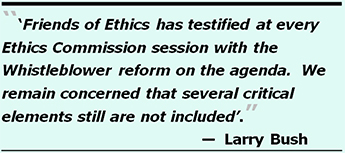 There is not a specific requirement that all records (including on private cell phones) be retained regardless of standard retention policies, that all employees and not just supervisors be trained on the rights of whistleblowers, and that there must be an ability to be protected from retaliation regardless of who is informed, including federal and state officials.
There is not a specific requirement that all records (including on private cell phones) be retained regardless of standard retention policies, that all employees and not just supervisors be trained on the rights of whistleblowers, and that there must be an ability to be protected from retaliation regardless of who is informed, including federal and state officials.
It must be recognized that contractors have been forced to engage in unlawful and improper acts by city managers overseeing their contracts, and such incidents must be heard by officials outside the affected agency. We plan to address these issues when the Board holds a hearing on the reforms, something it has not done after nearly a full year of the issue pending at the Board.”
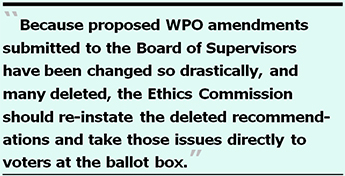 Other unresolved major issues include:
Other unresolved major issues include:
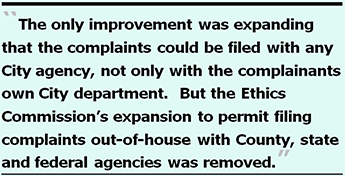 A major conflict remains. The proposed WPO amendments still appear to ignore California’s Whistleblower Protection Act — in particular, retaliation prohibited by California Labor Code §1102.5(b). Indeed, state Labor Code §1102.5(a) specifically states that employers — in this case, the City itself — may not adopt any rule or regulation preventing employees from disclosing information to a government agency, for instance to a state or federal agency. By removing — through omission — the explicit provision complaints can be filed with state agencies, the proposed WPO amendments appear to be deliberately adopting a rule to discourage City employees from filing complaints with the state of California.
A major conflict remains. The proposed WPO amendments still appear to ignore California’s Whistleblower Protection Act — in particular, retaliation prohibited by California Labor Code §1102.5(b). Indeed, state Labor Code §1102.5(a) specifically states that employers — in this case, the City itself — may not adopt any rule or regulation preventing employees from disclosing information to a government agency, for instance to a state or federal agency. By removing — through omission — the explicit provision complaints can be filed with state agencies, the proposed WPO amendments appear to be deliberately adopting a rule to discourage City employees from filing complaints with the state of California.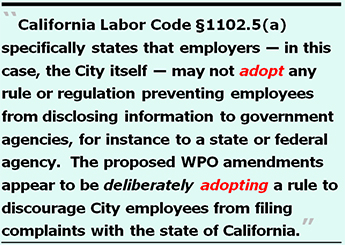 Again, to the Gang of Four’s credit, although the proposed amendments Ethics submitted to the Board of Supervisors in April 2016 did not include a provision about training to City employees on the WPO, the four-agency team did propose adding §4.115(f), titled “Whistleblower Protection Awareness Training” to the WPO to provide that the Controller, in collaboration with the Ethics Commission, shall author, and City Departments shall distribute, materials to “publicize and promote whistleblower protections as part of each department’s hew-hire training programs.”
Again, to the Gang of Four’s credit, although the proposed amendments Ethics submitted to the Board of Supervisors in April 2016 did not include a provision about training to City employees on the WPO, the four-agency team did propose adding §4.115(f), titled “Whistleblower Protection Awareness Training” to the WPO to provide that the Controller, in collaboration with the Ethics Commission, shall author, and City Departments shall distribute, materials to “publicize and promote whistleblower protections as part of each department’s hew-hire training programs.”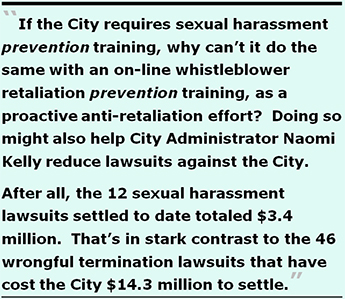 That’s in stark contrast to the 46 wrongful termination lawsuits that have cost the City $14.3 million to settle, including the estimated $7.5 million in costs for Joanne Hoeper’s March 17, 2017 wrongful termination jury verdict, associated City attorney costs, and her lawyer’s fees, but not yet including at least 11 other still-outstanding wrongful termination lawsuits.
That’s in stark contrast to the 46 wrongful termination lawsuits that have cost the City $14.3 million to settle, including the estimated $7.5 million in costs for Joanne Hoeper’s March 17, 2017 wrongful termination jury verdict, associated City attorney costs, and her lawyer’s fees, but not yet including at least 11 other still-outstanding wrongful termination lawsuits.Interested observers say other issues remain unaddressed, including:
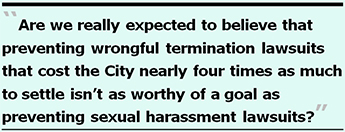 There’s no requirement in the WPO regarding retention of documents, including emails, by City agencies.
There’s no requirement in the WPO regarding retention of documents, including emails, by City agencies.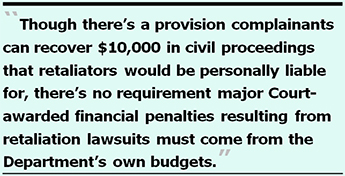 It provides too much authority to the City Controller to refer cases to City departments for investigation.
It provides too much authority to the City Controller to refer cases to City departments for investigation.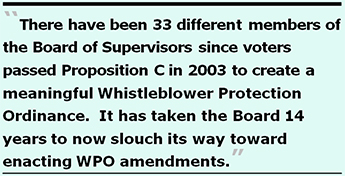 Delay Amending the WPO and a Paucity of Data
Delay Amending the WPO and a Paucity of Data
There’s no polite way to say this: The Board of Supervisors and the Ethics Commission have collectively done a terrible job of both amending the WPO, and monitoring data involving whistleblower complaints and retaliation complaints.
First, there have been 33 different members of the Board of Supervisors since voters passed Proposition C in 2003 requiring the Supervisors to create and maintain a meaningful Whistleblower Protection Ordinance. It has taken the Board 14 years to now slouch its way toward enacting WPO amendments. The proposed amendments discussed above and still incomplete as of this writing — which may be further water downed — are viewed by some observers as still not meaningful reforms, and short of the mark.
Second, the Board of Supervisors passed Ordinance 71-00 on April 28, 2000 requiring Ethics to collect and report annually to the Board the number and types of whistleblower complaints — and presumably retaliation complaints — received. That requirement was added to §4.130 of the WPO.
From records requests placed, it turns out that there has been just one annual report — in FY 2014–2015 — issued by Ethics detailing the seven different data elements required to be reported in §4.130.
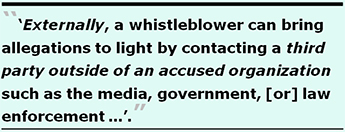 At the time of the Grand Jury’s May 2015 report, the Ethics Commission had had two Executive Directors — Virginia Vida for four years, and John St. Croix for 11 years — who should have known of this annual reporting obligation. There have been 28 Ethics Commissioners who have served between 2000 and 2015 who also should have known of their annual reporting duties. In addition, there have been 42 different members of the Board of Supervisors since 2000 (not including the Supervisor’s legislative aides). Didn’t any of the 42 Supervisors notice they weren’t receiving those annual reports of whistleblower complaints filed with the Ethics Commission?
At the time of the Grand Jury’s May 2015 report, the Ethics Commission had had two Executive Directors — Virginia Vida for four years, and John St. Croix for 11 years — who should have known of this annual reporting obligation. There have been 28 Ethics Commissioners who have served between 2000 and 2015 who also should have known of their annual reporting duties. In addition, there have been 42 different members of the Board of Supervisors since 2000 (not including the Supervisor’s legislative aides). Didn’t any of the 42 Supervisors notice they weren’t receiving those annual reports of whistleblower complaints filed with the Ethics Commission?
Between members of the Board of Supervisors, and the Ethics Commission’s Executive Directors and appointed Commissioners, these city officials appear to have collectively flunked the “straight-face test” if they’re asked whether they are doing their jobs to adopt meaningful WPO amendments and accurately report data required by WPO §4.130. It would be shocking if any of them said with a straight face that they’ve been doing the jobs voters expect of them.
Whistleblower Danger
Wikipedia has a useful summary of information about whistleblowers. The on-line encyclopedia notes:
“Those who become whistleblowers can choose to bring information or allegations to surface either internally or externally. Internally, a whistleblower can bring his/her accusations to the attention of other people within the accused organization such as an immediate supervisor. Externally, a whistleblower can bring allegations to light by contacting a third party outside of an accused organization such as the media, government, law enforcement, or those who are concerned. Whistleblowers, however, take the risk of facing stiff reprisal and retaliation from those who are accused or alleged of wrongdoing.”
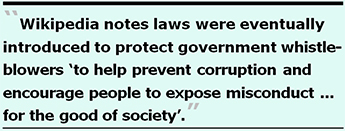 It notes external whistleblowers report misconduct to lawyers, the media, law enforcement, watchdog agencies, or other local, state, or federal agencies. Wikipedia notes laws were eventually introduced to protect government whistleblowers “to help prevent corruption and encourage people to expose misconduct, illegal, or dishonest activity for the good of society.”
It notes external whistleblowers report misconduct to lawyers, the media, law enforcement, watchdog agencies, or other local, state, or federal agencies. Wikipedia notes laws were eventually introduced to protect government whistleblowers “to help prevent corruption and encourage people to expose misconduct, illegal, or dishonest activity for the good of society.”
Whistleblower protection laws are enacted to prevent retaliatory personnel actions against employees who disclose information they reasonably believe involve violations of law, gross mismanagement, gross waste of funds, abuse of authority, or a substantial and specific danger to public safety or health.
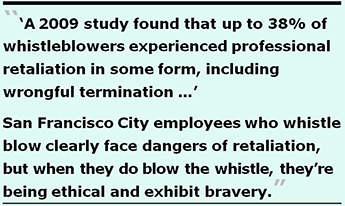 Finally, Wikipedia notes whistleblowers can face legal actions, criminal charges, social stigma, and termination from any position, office, or job. It reports that “a 2009 study found that up to 38% of whistleblowers experienced professional retaliation in some form, including wrongful termination” and whistleblowers often face a “shoot the messenger” mentality, placing them in grave danger.
Finally, Wikipedia notes whistleblowers can face legal actions, criminal charges, social stigma, and termination from any position, office, or job. It reports that “a 2009 study found that up to 38% of whistleblowers experienced professional retaliation in some form, including wrongful termination” and whistleblowers often face a “shoot the messenger” mentality, placing them in grave danger.
That whistleblowers often save municipal, state, and the federal government substantial amounts of public funds all too often goes unreported. San Francisco City employees who whistle blow clearly face dangers of retaliation, but when they do blow the whistle, they’re being ethical and exhibit bravery in doing so, and should be commended, not harassed.
Conversely, governments spend extraordinary amounts in whistleblower settlement awards and lawsuit expenses.
Four Pricey San Francisco Lawsuit Awards
Consider a general harassment lawsuit brought by two 9–1–1 dispatchers and three significant wrongful termination lawsuits filed by prominent City employees in recent years in San Francisco.
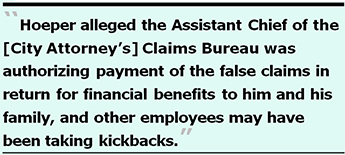 In addition, the City Controller’s highly-publicized audit finally ordered in November 2010 that LHH repay the $350,000 improperly misappropriated from the patient gift fund, including at least $276,000 deposited into the wrong accounts that had to be reallocated back into the gift fund.
In addition, the City Controller’s highly-publicized audit finally ordered in November 2010 that LHH repay the $350,000 improperly misappropriated from the patient gift fund, including at least $276,000 deposited into the wrong accounts that had to be reallocated back into the gift fund. She uncovered that property owners had been solicited by plumbing companies to do the work, plumbing companies were submitting false claims under no-bid contracts, and Claims Bureau employees were knowingly and illegally paying the false claims. She alleged the Assistant Chief of the [City Attorney’s] Claims Bureau was authorizing payment of the false claims in return for financial benefits to him and his family, and other employees may have been taking kickbacks involving approximately $10 million in unnecessary repair payments.
She uncovered that property owners had been solicited by plumbing companies to do the work, plumbing companies were submitting false claims under no-bid contracts, and Claims Bureau employees were knowingly and illegally paying the false claims. She alleged the Assistant Chief of the [City Attorney’s] Claims Bureau was authorizing payment of the false claims in return for financial benefits to him and his family, and other employees may have been taking kickbacks involving approximately $10 million in unnecessary repair payments.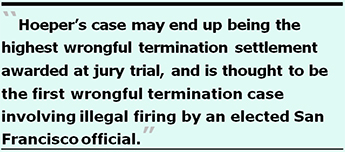 A Superior Court judge ruled in June 2016 that Hoeper had presented enough evidence to take her case to a jury trial. Herrera appealed to the Appellate Court, which let the Superior Court’s ruling stand. Still attempting to stop Hoeper, Herrera appealed to the State Supreme Court, which denied review of the City’s appeal in September 2016.
A Superior Court judge ruled in June 2016 that Hoeper had presented enough evidence to take her case to a jury trial. Herrera appealed to the Appellate Court, which let the Superior Court’s ruling stand. Still attempting to stop Hoeper, Herrera appealed to the State Supreme Court, which denied review of the City’s appeal in September 2016.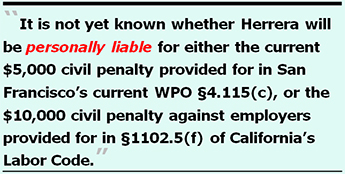 Previous reporting by Dr. Kerr and Dr. Rivero in September 2016 on their web site SFWhistleblowers.com noted that the law firm Keker and Van Nest represented Herrera against Hoeper’s lawsuit, that Keker’s billing submitted at that point had already approached $2.2 million to defend Herrera, and predicted Keker’s fees might climb to $3 million. Hoeper’s lawyers may also be awarded $2.5 million in legal fees.
Previous reporting by Dr. Kerr and Dr. Rivero in September 2016 on their web site SFWhistleblowers.com noted that the law firm Keker and Van Nest represented Herrera against Hoeper’s lawsuit, that Keker’s billing submitted at that point had already approached $2.2 million to defend Herrera, and predicted Keker’s fees might climb to $3 million. Hoeper’s lawyers may also be awarded $2.5 million in legal fees.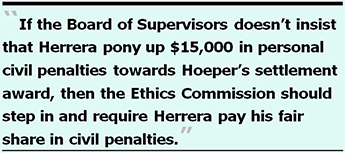 It is not yet known whether Herrera will be personally liable for either the current $5,000 civil penalty provided for in San Francisco’s current WPO §4.115(c), or the $10,000 civil penalty against employers provided for in §1102.5(f) of California’s Labor Code. Hopefully, the jury in Hoeper’s lawsuit will have ruled that Herrera is personally liable — if for no other reason than to send a message to other retaliators that they retaliate at their own financial peril, and to provide a future deterrent.
It is not yet known whether Herrera will be personally liable for either the current $5,000 civil penalty provided for in San Francisco’s current WPO §4.115(c), or the $10,000 civil penalty against employers provided for in §1102.5(f) of California’s Labor Code. Hopefully, the jury in Hoeper’s lawsuit will have ruled that Herrera is personally liable — if for no other reason than to send a message to other retaliators that they retaliate at their own financial peril, and to provide a future deterrent.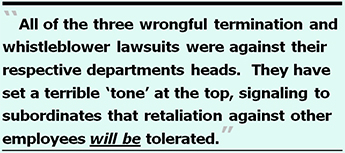 Just these four cases have cost the City — and by extension, taxpayers — nearly $11.6 million to date, including the $350,000 restitution to LHH’s patient gift fund, but costs in Hoeper’s case are preliminary estimates and may continue
Just these four cases have cost the City — and by extension, taxpayers — nearly $11.6 million to date, including the $350,000 restitution to LHH’s patient gift fund, but costs in Hoeper’s case are preliminary estimates and may continue
to grow.
All of the three wrongful termination and whistleblower lawsuits were against their respective departments heads: Director of Public Health Mitch Katz and Laguna Honda Hospital Executive Director Mivic Hirose in Kerr’s case, then Police Chief Greg Suhr in O’Haire’s case, and Herrera at the City Attorney’s Office in Hoeper’s case. Because the anti-retaliation tone should be set at the top of organizations, the three department heads have set a terrible “tone” at the top, signaling to subordinates that retaliation against other employees will be tolerated.
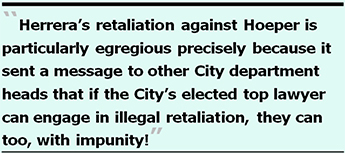 Herrera’s retaliation against Hoeper is particularly egregious precisely because it sent a message to other City department heads that if the City’s elected top lawyer can engage in illegal retaliation, they can too, with impunity!
Herrera’s retaliation against Hoeper is particularly egregious precisely because it sent a message to other City department heads that if the City’s elected top lawyer can engage in illegal retaliation, they can too, with impunity!
Sadly, Deborah Sherwood is still on the payroll at the Department of Public Health, having earned $135,364 in the fiscal year ending June 30, 2016. So is Mivic Hirose, who was paid $276,126 in the same period to keep running Laguna Honda Hospital. Then there’s Mr. Herrera, who was paid $240,798 that same fiscal year. They each continue to draw down lucrative salaries at taxpayer expense, in spite of clear and obvious wrongdoing against their subordinates.
Settlements Reach $58.2 Million (and Counting) … Plus Unlitigated Claims
 In July 2016, the Westside Observer published “Bullying Costs Soar to $41.6 Million” providing an update to previous reporting of costs associated with 27 different types of personnel actions prohibited by law. Between 2007 and May 29, 2016 costs had reached $41.6 million to settle 259 such lawsuits, plus another 63 cases then still outstanding, for a total of 322 lawsuits.
In July 2016, the Westside Observer published “Bullying Costs Soar to $41.6 Million” providing an update to previous reporting of costs associated with 27 different types of personnel actions prohibited by law. Between 2007 and May 29, 2016 costs had reached $41.6 million to settle 259 such lawsuits, plus another 63 cases then still outstanding, for a total of 322 lawsuits.
Two other lawsuits brought by employees of the Housing Authority were settled in 2014 for another $1.3 million, and between May 29, 2016 and March 8, 2017, another 24 lawsuits have been settled for a total of $8 million involving settlement awards and City Attorney costs. Joanne 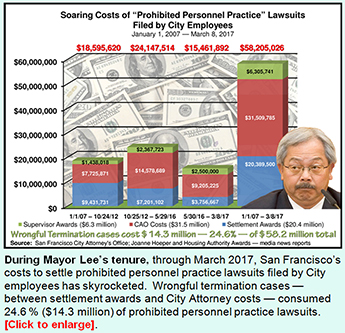 Hoeper’s recently-announced jury trial settlement award against her wrongful termination by City Attorney Dennis Herrera, and projected costs in City Attorney time and expenses in her case, appear to have added another $7.5 million alone. There’s been a $16.6 million increase to total settlement awards and City Attorney costs in the nine-month period between May 2016 and March 2017, and perhaps higher. Another eight new pending cases were added in the same period, with 71 cases now pending.
Hoeper’s recently-announced jury trial settlement award against her wrongful termination by City Attorney Dennis Herrera, and projected costs in City Attorney time and expenses in her case, appear to have added another $7.5 million alone. There’s been a $16.6 million increase to total settlement awards and City Attorney costs in the nine-month period between May 2016 and March 2017, and perhaps higher. Another eight new pending cases were added in the same period, with 71 cases now pending.
That gets us up to a minimum of $58.2 million and growing in on-going costs, between the 286 cases now settled to date plus 71 lawsuits now still outstanding, for a total of 357 lawsuits, including 57 cases involving wrongful termination.
That’s not yet including additional settlement awards from the Board of Supervisors for back pay awards or other amounts not processed through the City Attorney’s Office, and whether Hoeper’s estimated $2.5 million in lawyer’s fees will be paid by the Board of Supervisors or by the City Attorney’s Office. It will take some time to sort out discrepancies in the data, and will be the focus of a future article.
As far as that goes, since 2007 the City has spent $31.5 million in City Attorney time and expenses to fight a total of $26.7 million in various settlement awards. Something is seriously out-of-whack here.
The $58.2 million in costs involving lawsuits against the City does not include the as-yet unknown amount of awards made for unlitigated claims involving “employment disputes” paid by the City Attorney’s Office  between 2007 and 2017 in cases that did not advance to lawsuits, since a response from the City Attorney to a records request has not yet been received.
between 2007 and 2017 in cases that did not advance to lawsuits, since a response from the City Attorney to a records request has not yet been received.
The Wrongful Termination Lawsuits
An update to settlement awards and City Attorney costs through March 8, 2017shows that costs in the 46 wrongful termination lawsuits settled to date have reached $14.3 million, 24.6% of the $58.2 million in costs involving prohibited personnel practice lawsuits between 2007 and March 2017. The wrongful termination lawsuits involved $7.3 million in  settlement and back-pay awards to City employees, while the City spent an outrageous $7 million fighting those lawsuits every step of the way. Currently, another 11 wrongful termination lawsuits remain pending.
settlement and back-pay awards to City employees, while the City spent an outrageous $7 million fighting those lawsuits every step of the way. Currently, another 11 wrongful termination lawsuits remain pending.
Of the 46 wrongful termination lawsuits settled through March 2017, 22 — nearly half — paid settlement awards to City employees; all of the 46 cases involved significant City Attorney time and expenses fighting those lawsuits. The employees who filed the cases are identified here.
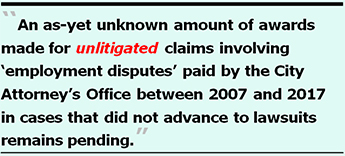 Fully 36 of the 46 wrongful termination lawsuits settled to date were filed by employees in just six City departments, including the Department of Public Health, MUNI, Police Department, Public Works, Fire Department, and Human Services Agency.
Fully 36 of the 46 wrongful termination lawsuits settled to date were filed by employees in just six City departments, including the Department of Public Health, MUNI, Police Department, Public Works, Fire Department, and Human Services Agency.
And a whopping $11.5 million — 80.3% — of the 46 wrongful termination lawsuits settled to date involved just three City Departments, including the City Attorney’s Office, the Department of Public Health, and the Police Department
But as I had noted in “Bullying Costs Soar to $41.6 Million” we may never know how many wrongful termination cases have actually beenbrought by San Francisco city employees because of the way they are classified by the City Attorney’s Office, which appears to use a different nomenclature to categorize cases than the Courts do.
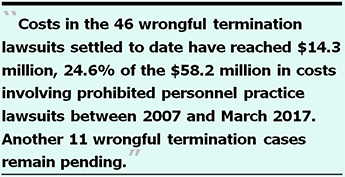 As I noted last July, one lawsuit the City Attorney had categorized as a First Amendment case, the Superior Court had characterized as a Racial Discrimination case, instead.
As I noted last July, one lawsuit the City Attorney had categorized as a First Amendment case, the Superior Court had characterized as a Racial Discrimination case, instead.
A case the City Attorney had categorized as an “Other-Actions by Employees Against City” lawsuit was characterized by the Superior Court as alleging 10 factors, including Racial Discrimination, Harassment Based on Race, Constructive Discharge, Retaliation, and Harassment Based on Disability, along with five other causes.
Two cases the City Attorney classified as “6080 Disability Discrimination” lawsuits were considered in Superior Court records to be “Wrongful Discharge” lawsuits.
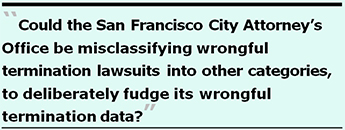 And a case the City Attorney classified as a “General Harassment (Emp against City)” lawsuit again showed in Superior Court records to be another “Wrongful Discharge” lawsuit.
And a case the City Attorney classified as a “General Harassment (Emp against City)” lawsuit again showed in Superior Court records to be another “Wrongful Discharge” lawsuit.
Could the San Francisco City Attorney’s Office be misclassifying wrongful termination lawsuits into other categories, to deliberately fudge its wrongful termination data?
Whistleblower Bravery
 In all of these cases, San Francisco City employees have faced great danger, and the costs to the City have been significant, given the bravery it has taken City employees to fight corruption in City government.
In all of these cases, San Francisco City employees have faced great danger, and the costs to the City have been significant, given the bravery it has taken City employees to fight corruption in City government.
Rachel Maddow recently reported on Russian president Vladimir Putin’s opponent, Alexei Navalny, and Navalny’s “Anti-Corruption Project”:
“It has already taken daring and bravery, particularly from the leakers and the whistleblowers, and the intelligence sources. But it is worth remembering that bravery does not happen in safe places. Bravery does not happen where it is safe. Bravery happens in the presence of real danger.”
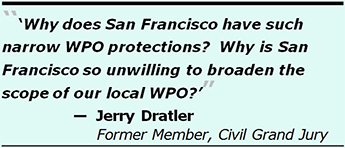 — Rachel Maddow, March 3, 2017
— Rachel Maddow, March 3, 2017
“Putin Critic Takes Big Risk Exposing Corruption”
Danger from retaliation is what San Francisco City employee whistleblowers face, too.
Jerry Dratler, a former member of San Francisco’s 2014–2015 Civil Grand Jury that issued its report on the Whistleblower Protection Ordinance, notes:
“When you compare San Francisco’s WPO with Los Angeles and other cities, and the State or Federal government, the protections are very narrow and were further narrowed in recent years. The trend in government appears to be broadening whistleblower protections, not narrowing them. Why does San Francisco have such narrow WPO protections? Why is San Francisco so unwilling to broaden the scope of our local WPO?”
Just how long will it take City employees to obtain genuine and meaningful anti-retaliation protections? The proposed WPO amendments winding their way through City Hall are not “genuine” or “meaningful.”
 It’s already been 14 years since voters passed Prop C in 2003. It has taken almost two years following the Grand Jury’s report in May 2015 for proposed WPO amendments to slouch toward being addressed by the Board of Supervisors.
It’s already been 14 years since voters passed Prop C in 2003. It has taken almost two years following the Grand Jury’s report in May 2015 for proposed WPO amendments to slouch toward being addressed by the Board of Supervisors.
Is the City just kicking the can down the road? Will it take another 14 years, adding up to a full generation of City employees? And at what cost?
Monette-Shaw is a columnist for San Francisco’s Westside Observer newspaper, and a retired San Francisco City employee. He received a James Madison Freedom of Information Award in the “Advocacy” category from the Society of Professional Journalists–Northern California Chapter in 2012. He’s a member of the California First Amendment Coalition (FAC) and the ACLU. He can be contacted at monette-shaw@westsideobserver.com.
Postscript (April 3, 2017)
This article set out to compare WPO amendment recommendations submitted by the Ethics Commission to the Board of Supervisors in March 2016 to amendment changes proposed as of January 2017 following the four-agency review. The two source documents showed additions to the existing ordinance as being underlined and deletions as being struck out.
Just as I was preparing to post this article on-line, I received on April 3 an update to the proposed WPO amendments following the labor union meet-and-confer process on March 13, 2017.
Some versions used the “Track Changes” feature in Microsoft Word and not the traditional strike-out/font manipulation used in drafts that are eventually submitted to the Board of Supervisors. Once the changes are accepted by all of the drafters at Ethics, the City Controller, and the Department of Human Resources, changes will be finalized using the traditional strike-out, underline, and font-change features typically found in proposed City ordinances.
It is difficult telling what changes in the working drafts will be incorporated into the final amendments to the Whistle
blower Protection Ordinance submitted to the Board of Supervisors, and the process may apparently still be incomplete.
Additional Changes
Upshot: Not all of the recommendations Ethics had proposed in March 2016 have survived successive collaborative editing!